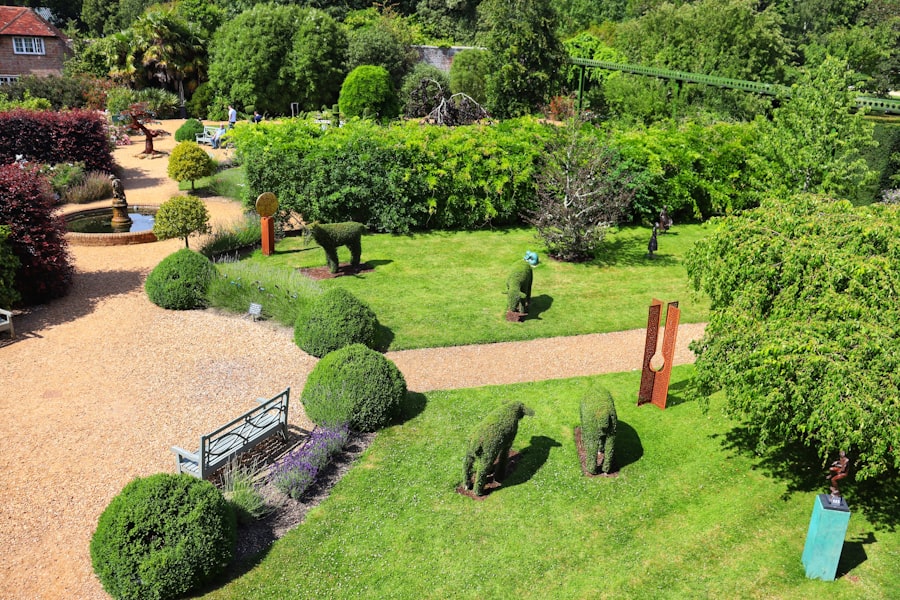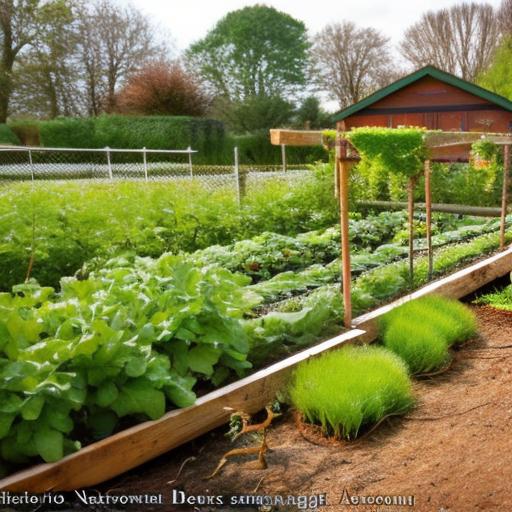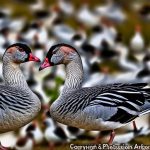Geese can be a beautiful sight in nature, but when they invade your garden, they can quickly become a nuisance. These large birds can cause damage to plants, leave behind droppings that are unsightly and unsanitary, and even become aggressive towards humans or other animals. It’s important to deter geese from gardens to protect your plants and maintain a clean and safe outdoor space. In this article, we will discuss various methods that can be used to deter geese from gardens, including physical barriers, visual deterrents, sound deterrents, scents, planting vegetation that geese dislike, water-based deterrents, removing attractive food sources, and seeking professional help.
Key Takeaways
- Geese are social animals and tend to stay in groups.
- Geese are attracted to open spaces with easy access to water and food.
- Physical barriers such as fences and netting can prevent geese from entering gardens.
- Visual deterrents such as decoys and reflective tape can scare geese away.
- Sound deterrents such as loud noises and predator calls can also be effective in repelling geese.
Understanding the Behavior of Geese
To effectively deter geese from gardens, it’s important to understand why they are attracted to these areas in the first place. Geese are attracted to gardens because they provide a source of food and water, as well as a safe and comfortable environment. Gardens often have lush vegetation that geese can graze on, and they may also find insects or other small animals to eat. Additionally, gardens often have water sources such as ponds or birdbaths that geese can use for drinking and bathing.
Geese are social animals that typically travel in flocks. They have a strong sense of community and will often return to the same location year after year if it provides them with the resources they need. Geese are also territorial and will defend their nesting sites aggressively. This territorial behavior can lead to conflicts with humans or other animals that come too close to their nesting areas.
Choosing the Right Garden Location
The location of your garden can greatly affect the presence of geese. If you live near a body of water or open fields where geese are known to congregate, it’s more likely that they will visit your garden. However, there are steps you can take to choose a location that is less attractive to geese.
One tip is to avoid planting your garden near bodies of water or open fields where geese are known to gather. Geese are more likely to visit areas that provide easy access to food and water sources. By choosing a location that is further away from these areas, you can reduce the likelihood of geese visiting your garden.
Another tip is to create barriers around your garden to make it less accessible to geese. This can include installing fences or hedges that are tall enough to prevent geese from entering. You can also use natural barriers such as rocks or shrubs to create obstacles that geese are less likely to navigate.
Creating Physical Barriers
Physical barriers are one of the most effective methods for keeping geese out of gardens. There are several types of physical barriers that can be used, depending on the size and layout of your garden.
One option is to install a fence around your garden. The fence should be at least three feet tall and have small openings or mesh that is too small for geese to squeeze through. It’s also important to make sure the fence is secure and doesn’t have any gaps or holes that geese can slip through.
Another option is to use netting or bird netting to cover your plants. This can be especially useful if you have specific plants that geese are particularly attracted to. The netting should be securely fastened and cover the entire plant, including the top and sides, to prevent geese from accessing the leaves or fruits.
Using Visual Deterrents
Visual deterrents can be an effective way to scare geese away from gardens. Geese are wary of unfamiliar objects or movements, so placing visual deterrents in your garden can make them think twice about landing or staying in the area.
One example of a visual deterrent is a scarecrow. Scarecrows can be made from old clothes stuffed with straw or other materials and placed strategically in the garden. The scarecrow should be positioned in a way that it can be seen from all angles, and it can be moved periodically to make it appear more lifelike.
Another visual deterrent is reflective tape or shiny objects. Geese are often scared away by bright or reflective surfaces, so hanging strips of reflective tape or tying shiny objects such as CDs or aluminum foil to stakes in the garden can help deter them. These objects should be placed at different heights and angles to create movement and catch the sunlight.
Installing Sound Deterrents

Sound deterrents can be an effective way to repel geese from gardens. Geese are sensitive to loud or unexpected noises, so using sound deterrents can startle them and make them uncomfortable in the area.
One option is to use a motion-activated sprinkler system. These systems are equipped with sensors that detect movement and then release a burst of water accompanied by a loud noise. The sudden spray of water and noise can scare geese away and discourage them from returning to the garden.
Another option is to use ultrasonic devices that emit high-frequency sounds that are unpleasant to geese. These devices are often battery-operated and can be placed strategically around the garden. The high-frequency sounds are inaudible to humans but can be irritating to geese, causing them to leave the area.
Utilizing Scents to Repel Geese
Certain scents can be used to repel geese from gardens. Geese have a strong sense of smell and are sensitive to certain odors, so using scents that they find unpleasant can help deter them.
One example of a scent deterrent is citrus oil. Geese dislike the smell of citrus, so spraying citrus oil around the garden or placing citrus peels near plants can help keep them away. It’s important to reapply the citrus oil or replace the peels regularly to maintain the scent.
Another scent deterrent is predator urine. Geese are naturally wary of predators, so using predator urine, such as coyote or fox urine, can make them think twice about landing or staying in the garden. Predator urine can be purchased at garden supply stores and should be applied according to the manufacturer’s instructions.
Planting Vegetation that Geese Dislike
Planting vegetation that geese dislike can help deter them from gardens. Geese have specific preferences when it comes to plants, so choosing varieties that they find unappealing can make your garden less attractive to them.
One type of plant that geese dislike is tall grasses or reeds. These plants provide cover and nesting sites for geese, so by planting them in your garden, you can discourage geese from landing or staying in the area. Tall grasses or reeds should be planted in clusters or rows to create a barrier that geese are less likely to navigate.
Another type of plant that geese dislike is prickly or thorny shrubs. Geese prefer open areas where they can easily access food and water sources, so planting shrubs with thorns or prickly leaves can make your garden less appealing to them. Examples of shrubs that geese dislike include holly, barberry, and roses.
Implementing Water-Based Deterrents
Water-based deterrents can be an effective way to repel geese from gardens. Geese are attracted to water sources, so using water-based deterrents can make your garden less appealing to them.
One option is to install a motion-activated sprinkler system near your garden. When geese approach the area, the sprinkler system will activate and release a burst of water, scaring them away. This method is effective because it combines the element of surprise with the discomfort of being sprayed with water.
Another option is to use a floating alligator decoy in any water features in your garden. Geese are naturally wary of predators, so the presence of an alligator decoy can deter them from landing or staying in the area. The decoy should be moved periodically to make it appear more lifelike.
Removing Attractive Food Sources
Geese are attracted to gardens because they provide a source of food, so removing or limiting these food sources can help deter them. There are several steps you can take to remove or limit attractive food sources in your garden.
One tip is to remove fallen fruits or vegetables from the ground. Geese are attracted to ripe fruits and vegetables, so regularly picking up fallen produce can help reduce their presence in the garden. It’s also important to dispose of the fruits and vegetables properly, as leaving them near the garden can still attract geese.
Another tip is to cover compost piles or bins. Geese are attracted to compost piles because they provide a source of insects and other small animals. By covering the compost piles or bins, you can prevent geese from accessing the food source and discourage them from visiting the garden.
Seeking Professional Help
In some cases, it may be necessary to seek professional help to deter geese from gardens. If you have tried various methods and are still experiencing issues with geese, a professional wildlife control company can provide additional assistance.
When seeking professional help, it’s important to find a reputable company that specializes in wildlife control. They will have the knowledge and experience to effectively deter geese from gardens without causing harm to the birds or the environment. It’s also important to discuss your specific needs and concerns with the professional so they can tailor their approach to your situation.
Detering geese from gardens can be a challenging task, but by using a combination of methods, you can effectively reduce their presence and protect your plants. It’s important to try different methods and find what works best for your garden, as each situation is unique. Whether you choose to create physical barriers, use visual or sound deterrents, utilize scents, plant vegetation that geese dislike, implement water-based deterrents, remove attractive food sources, or seek professional help, the key is to be persistent and consistent in your efforts. With time and patience, you can enjoy a garden free from the nuisance of geese.
If you’re struggling with keeping geese out of your vegetable garden, you might find this article on Poultry Wizard helpful. It provides valuable insights and tips on how to protect your garden from these persistent birds. From understanding their behavior to implementing effective deterrents, this article offers practical solutions to keep your vegetables safe. Check it out here for expert advice on maintaining a goose-free garden.
FAQs
What are some common methods to keep geese out of a vegetable garden?
Some common methods to keep geese out of a vegetable garden include using physical barriers such as fences or netting, using decoys or scare tactics, and planting certain types of plants that geese do not like.
What types of fences or netting are effective in keeping geese out of a vegetable garden?
Fences or netting that are at least 4 feet tall and have small openings (less than 2 inches) are effective in keeping geese out of a vegetable garden. Electric fences can also be used, but they require more maintenance.
What are some effective scare tactics to keep geese away from a vegetable garden?
Some effective scare tactics to keep geese away from a vegetable garden include using decoys such as fake predators or reflective tape, using noise makers such as wind chimes or horns, and using motion-activated sprinklers.
What types of plants do geese not like?
Geese do not like plants that have strong smells or tastes, such as herbs like rosemary or thyme, or plants with prickly leaves like holly or juniper. They also tend to avoid plants with tall, dense foliage like sunflowers or corn.
Are there any humane methods to keep geese out of a vegetable garden?
Yes, there are many humane methods to keep geese out of a vegetable garden, such as using physical barriers or scare tactics. It is important to avoid using harmful or lethal methods, as geese are protected by federal law.
Meet Walter, the feathered-friend fanatic of Florida! Nestled in the sunshine state, Walter struts through life with his feathered companions, clucking his way to happiness. With a coop that’s fancier than a five-star hotel, he’s the Don Juan of the chicken world. When he’s not teaching his hens to do the cha-cha, you’ll find him in a heated debate with his prized rooster, Sir Clucks-a-Lot. Walter’s poultry passion is no yolk; he’s the sunny-side-up guy you never knew you needed in your flock of friends!







